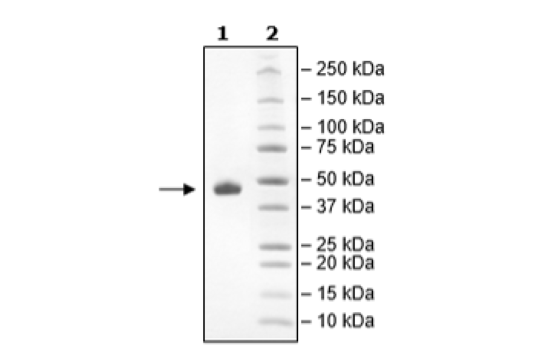OX40 (CD134), Avi-Tag, His-Tag Recombinant
Recombinant human OX40, also known as CD134, encompassing amino acids 29-216. This construct contains a C-terminal Avi-Tag™ followed by an His-tag (10xHis). This protein was affinity purified.
≥90%
Aqueous buffer solution.
8 mM phosphate, pH 7.4, 110 mM NaCl, 2.2 mM KCl, and 20% glycerol
OX40 (also known as CD134, TNF receptor superfamily member 4, or TNFRSF4) is an immune checkpoint and a co-stimulatory receptor of the TNF (tumor necrosis factor) receptor family, expressed on the surface of T cells. Binding of OX40 to its ligand, OX40L (also known as CD252), potentiates T cell activation, differentiation, proliferation, survival, and T cell effector function. OX40L is present in NK cells, participating in their activation and cytotoxicity profile, and dendritic cells. OX40 can bind to members of the TRAF (TNFR associated factor) family of proteins, which can then regulate the NF-κF (nuclear factor kappa-light chain enhancer of activated B cells) signaling pathway. OX40 and OX40L can be found in cancer cells, such as AML (acute myeloid leukemia) and breast cancer cells. Studies have shown that OX40 agonists can increase anti-tumor immunity and improve tumor-free survival in pre-clinical studies. Alternatively, OX40 antagonists offer potential as therapeutics for inflammatory diseases. The development of new modulators of the OX40/OX40L activity are promising therapies for patients suffering from solid tumors or auto-immune disorders.


